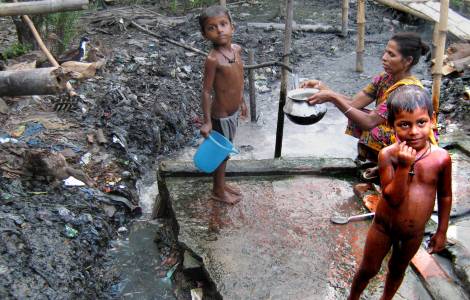
New Delhi (Agenzia Fides) - "The growing atrocities on the Dalits give the impression that India is returning to the age of Manu Smriti when Dalits were treated worse than slaves": this is what Archbishop Thomas Menamparampil, now emeritus says to Fides, who for years was at the head of the archdiocese of Guwahati, in Northeast India, and worked at the Federation of the Episcopal Conferences in Asia, referring to the ancient "Manu Smriti" system, based on Hindu holy texts, dating back to the year 100 after Christ.
The "pariah" or "dalit" (errroneously "untouchables" but the correct meaning is "oppressed", ndr) are the "outcasts" or 5th caste in the Hindu social and religious system, which also includes tribals.
"The media reported recently that a 21- year-old Dalit man was beaten to death allegedly by a group of men belonging to a senior caste in Anand district, Gujarat. According to the news, he was killed only for reasons of caste", explains Mgr. Menamparampil.
In another incident, two Dalits were beaten at the end of September in the village of Limbodra in Gandhinagar district. On October 4, Dalit activists
protested in Gandhinagar signaling the growing violence against Dalits. In July 2016, four Dalits were tied to a car and lashed for the alleged killing of a cow while they were only removing the carcass.
"During the 2014 elections, Prime Minister Narendra Modi had spoken of the development model of Gujarat as ideal. The atrocities carried out on the Dalits in Gujarat highlight that something is fundamentally wrong in the social model of Gujarat. The government of Gujarat did not manage to stop the
discrimination against Dalits and attacks on innocents continue", notes Mgr. Menamparampil.
Recent studies and investigations reveal widespread discrimination against the Dalits, especially in rural districts. The "Dalit Sangathan Gujarat" organization, which defends the rights, speaks of "the government's lethargic attitude in Gujarat": "The government had ensured that the case of the Dalits publicly lashed would have been dealt within 60 days. A year later, the 12 accused are out of jail on bail. In such circumstances, how can one have hope in justice in this system?".
The Indian Constitution provides strict action against atrocities on Dalits, but the law has not been enforced. On October 3, the Indian newspaper "Times of India" reported figures of crimes against Dalits. "The cases of atrocity against the outcasts grew dramatically from 26,127 in 2005 to 45,003 in 2015. Analysts say that after the Baratiya Janata Party (BJP) took power, atrocities against Dalits have increased".
According to Archbishop Emeritus Shillong, "BJP has adopted various strategies to gain the votes of Dalits, but on the other hand Hindu extremist organizations that support that party, such as Sangh Parivar and Rashtriya Swayamsevak Sangh (RSS), have not changed mindset and glorify the era of Manu Smriti". According to Savarkar, an RSS ideologist, "Manu Smriti's code is an adorable writing for our Hindu nation and is the basis of our culture, customs, thoughts and practices". Among these practices, many are discriminatory and even derisive towards Dalits.
"Groups such as Sangh Parivar would like to reintroduce them in today’s India, or to keep the Dalits and tribal in the nation without giving them equal dignity, rights and freedoms", explains to Fides Fr. Suresh Mathew, OFM, Indian Franciscan Friar. And he adds: "As long as a government influenced and guided by the ideology of Hindutva and Manu Smriti remains in power, discrimination and violence on Dalits are set to increase. The new generation of Dalit leaders has to work together with secular forces to prevent the drift of Indian society towards Manu Smriti". (PN-PA) (Agenzia Fides, 16/10/2017)